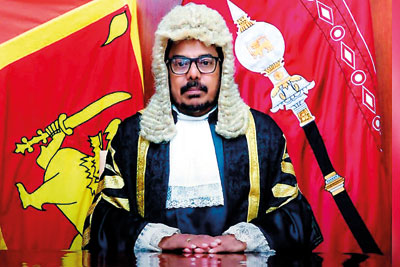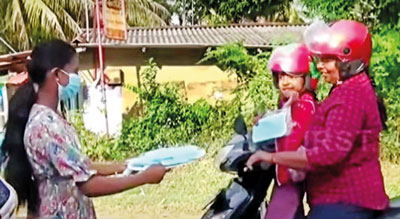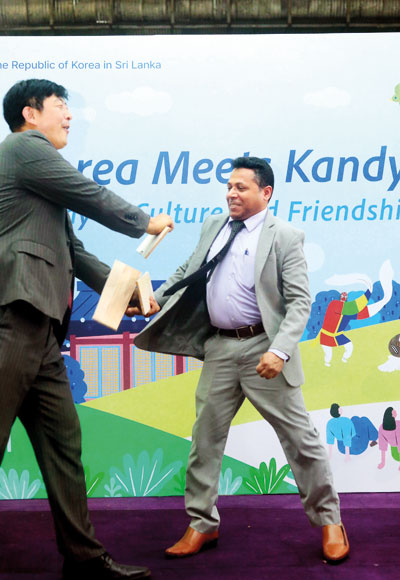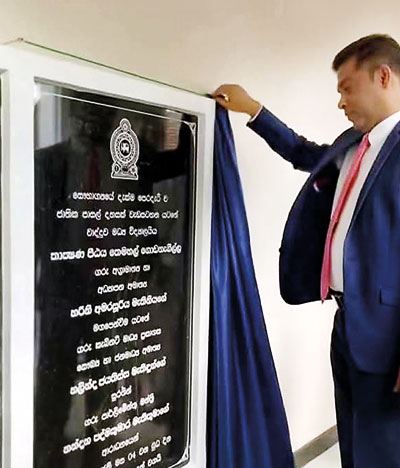Columns
Six months later, Ranwala says his PhD certificate may take more time to come
View(s):Friday (13) marked six months since Gampaha district parliamentarian Asoka Ranwala was forced to step down as Speaker of Parliament less than a month into his tenure amid questions over his educational qualifications, particularly his claim of having obtained a PhD from a Japanese university.
When he resigned from the exalted seat on December 13 last year, Mr Ranwala said he was stepping down not to cause further inconvenience to the government due to the controversy. He claimed he was having difficulty in immediately obtaining from the research institute affiliated with Japan’s Waseda University some of the documents that were necessary to prove his educational qualifications. He insisted he would obtain those documents and present them “as soon as possible”.

Ashoka Ranwala
The NPP government, too, staunchly backed Mr Ranwala, with the party also peddling the line that Mr Ranwala had not lied about his educational qualifications and would be presenting the necessary proof in due course.
When contacted on Friday, Mr Ranwala said it would still take “some more time” to produce his educational qualifications. “I have spoken about this with the party, and I will produce the qualifications,” he said, without giving a timeframe of when he hoped to do so. Mr Ranwala did not explain what difficulties he was having in accessing the necessary documents to prove he had indeed obtained his doctorate.
A Janatha Vimukthi Peramuna (JVP) spokesman confirmed that no disciplinary action had been taken against Mr Ranwala so far over the failure to produce his educational qualifications as promised, while NPP General Secretary Dr Nihal Abeysinghe said he was unable to comment on the matter as he had not spoken to Mr Ranwala about it recently.
Study identifies challenges to minority politics as majoritarian nationalism makes gains
A recent academic study carried out in partnership with a UK university on recent local poll results indicates how a once vibrant and successful minority political landscape is facing severe challenges due to majoritarian nationalism. It also highlights that minority politics is being stunted by a lack of vision, identity and leadership within minorities’ own political parties.
The report is an output of the ‘Minority Empowerment for Democracy and Pluralism’ programme, a two-year European Union-funded project that aims to strengthen the political participation of minority groups in Sri Lanka.
The programme is jointly implemented by the Minority Rights Group (MRG), the Centre for Development and Emergency Practice (CENDEP) at Oxford Brookes University, the Human Development Organisation (HDO), the Eastern Social Development Foundation (ESDF) and the Sri Lanka Development Journalist Forum (SDJF).
The report indicates that minority parties have experienced fragmentation, driven by ineffective leadership, allegations of corruption, and ideological divergences among their members. These issues have resulted in disarray, division and a loss of credibility.
Dansal come in many forms and shapes

Arogya Parama Labha: The facemask dansala in Kantale
More than 19,000 ‘Dansal’ (free food stalls) were held throughout the country during this week’s Poson festival. There were some highly unusual and interesting ‘Dansal’ among them.
A ‘Dansal’ to distribute kites for children was held in Akmeemana and drew a large crowd of enthusiastic little ones. A group of teachers and students in Kantale organised a ‘Facemask Dansal’ where they handed out facemasks to motorists and pedestrians. A burger ‘Dansal’ organised in Mapalagama also attracted a lot of attention. Meanwhile, a group of young people in a village in Pathadumbara, Kandy, organised a ‘Dansal’ where they offered grass to cattle in the village.
A shop in Pilimathalawa held a vegetable ‘Dansal’. A hair-cutting ‘Dansal’ was held in Gampaha. There was also a ‘Dansal’ in Thirappane where mechanics offered free ‘technical services’ to repair vehicles that had mechanical faults.
State institutions get a month’s extension to submit performance reports
State institutions have been given one more month—30 days—to submit annual performance reports to Parliament after the end of every financial year.
The new extension was given by a Treasury circular to state entities, including ministries, departments and secretariats.
In keeping up with the Public Financial Management Act, the performance reports of those institutions should also be published on the official websites of the respective entities once submitted to Parliament, the circular reads.

Vice Chancellor Terrence Madhujith trying out a taekwondo move with a Korean diplomat. Pic by L.B. Senaratne
Korea takes taekwondo to Kandy
Peradeniya University Vice Chancellor Terrence Madhujith inaugurated the first-ever ‘Taekwondo’ board tournament at the Korean-Kandy cultural festival.
Organised jointly by the Korean Embassy and the University of Peradeniya, the festival was held
at the university gymnasium.
Korean Ambassador Myson Lee noted that the cultural event was a celebration of friendship and cultural harmony with the people of Kandy. Apart from the teams that took part in the tournament, a Korean diplomat and the vice chancellor also tried their hands in the popular Korean sport.
Plaque policy: Minister explains why he did not want to remove his name

Minister Nalinda Jayatissa unveiling the plaque at the school building opening ceremony
Health Minister and Cabinet spokesman Nalinda Jayatissa, who is often left defending his ministerial colleagues before the media, had to face some uncomfortable questions this week at the weekly cabinet media briefing when he was asked about the unveiling of a plaque at a school event in Wadduwa where his name and that of Prime Minister Harini Amarasuirya were etched onto it.
The reason why such a routine exercise has become a controversy is due to the well-publicised decision of the ruling party not to include names of politicians on any such signboards.
When queried why he was going against the NPP’s self-imposed undertaking, Dr Jayatissa explained that he had been invited to the school event by the principal of the school, and while there, he had been asked to unveil the plaque. It was then that he saw his name and that of the PM on it.
“I was invited to come for the opening of the two-storey building in which the technical studies unit of the school would be set up. It’s the first time in many years that the school has got a new building, and I went in my vehicle, like all our ministers, with no escort vehicles, and was invited to unveil the plaque. That is when I saw the names,” he told reporters.
He added that there was an opportunity for him to be a social media warrior by taking a radical stand and saying this is wrong and they should have it removed immediately, but he had acted in a manner so that an important school event would not be disrupted. “It was an important day from the principal, teachers and students, and hence I did not say anything. Even though it was against our policy, I did not want to create a scene. We are opposed to putting our names on plaques. “Not only my name but even the name of the prime minister was there.”
This was so in the past and will remain in the future. As this is the government position, it would be good if the others cooperate and keep our names out of such name boards,” he said.
No permanent enemies in politics
Looking at recent behind-the-scenes negotiations among the political parties to form administrations in local bodies, one may wonder what has happened to principles and political attacks on opponents during the election campaign period.
Even those who seemed to be at loggerheads in front of electors turned out to be secret negotiators with the same parties they bashed just weeks ago, for the pure purpose of ensuring their party’s rule in local councils. Tamil politics is not an exception either.
On Friday, the Ilankai Thamil Arasu Katchchi (ITAK) secured the Jaffna Municipal Council, with its newly elected member, Vathani Vivekanandarajah, being elected as mayor. To make this happen, the grand old Tamil party has to make some ‘unholy’ pacts with other political parties, including the Eelam Peoples’ Democratic Party (EPDP), the Samgi Jana Balaweggaya (SJB) and the United National Party (UNP).
In the past, the ITAK had accused the EPDP of carrying out violent politics, particularly after an attack on the late ITAK leader Mavai Senathirajah during the 2001 parliamentary polls campaigning in the northern islands. But this week, the two parties entered into an agreement to run a local body.
Not only that, to secure the Nallur Pradeshiya Sabha, the ITAK also agreed to work with the former Northern Province Chief Minister, C.V. Wigneswaran, who broke away from the same party to form his own party. Weeks ago, both parties exchanged heated statements as well.
If the business of business is business, then one could say the politics of politics is politics. It is the same difference.
Buying or selling electronics has never been easier with the help of Hitad.lk! We, at Hitad.lk, hear your needs and endeavour to provide you with the perfect listings of electronics; because we have listings for nearly anything! Search for your favourite electronic items for sale on Hitad.lk today!


Leave a Reply
Post Comment